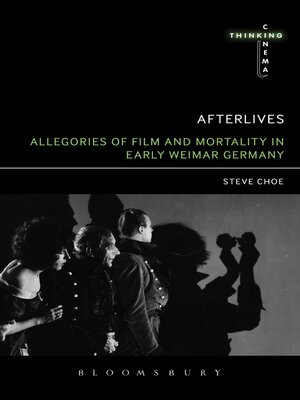Afterlives
ebook ∣ Allegories of Film and Mortality in Early Weimar Germany · Thinking Cinema
By Steve Choe

Sign up to save your library
With an OverDrive account, you can save your favorite libraries for at-a-glance information about availability. Find out more about OverDrive accounts.
Find this title in Libby, the library reading app by OverDrive.



Search for a digital library with this title
Title found at these libraries:
| Loading... |
Weimar cultural critics and intellectuals have repeatedly linked the dynamic movement of the cinema to discourses of life and animation. Correspondingly, recent film historians and theorists have taken up these discourses to theorize the moving image, both in analog and digital. But, many important issues are overlooked. Combining close readings of individual films with detailed interpretations of philosophical texts, all produced in Weimar Germany immediately following the Great War, Afterlives: Allegories of Film and Mortality in Early Weimar Germany shows how these films teach viewers about living and dying within a modern, mass mediated context.
Choe places relatively underanalyzed films such as F. W. Murnau's The Haunted Castle and Arthur Robison's Warning Shadows alongside Martin Heidegger's early seminars on phenomenology, Sigmund Freud's Reflections upon War and Death and Max Scheler's critique of ressentiment. It is the experience of war trauma that underpins these correspondences, and Choe foregrounds life and death in the films by highlighting how they allegorize this opposition through the thematics of animation and stasis.
Choe places relatively underanalyzed films such as F. W. Murnau's The Haunted Castle and Arthur Robison's Warning Shadows alongside Martin Heidegger's early seminars on phenomenology, Sigmund Freud's Reflections upon War and Death and Max Scheler's critique of ressentiment. It is the experience of war trauma that underpins these correspondences, and Choe foregrounds life and death in the films by highlighting how they allegorize this opposition through the thematics of animation and stasis.






